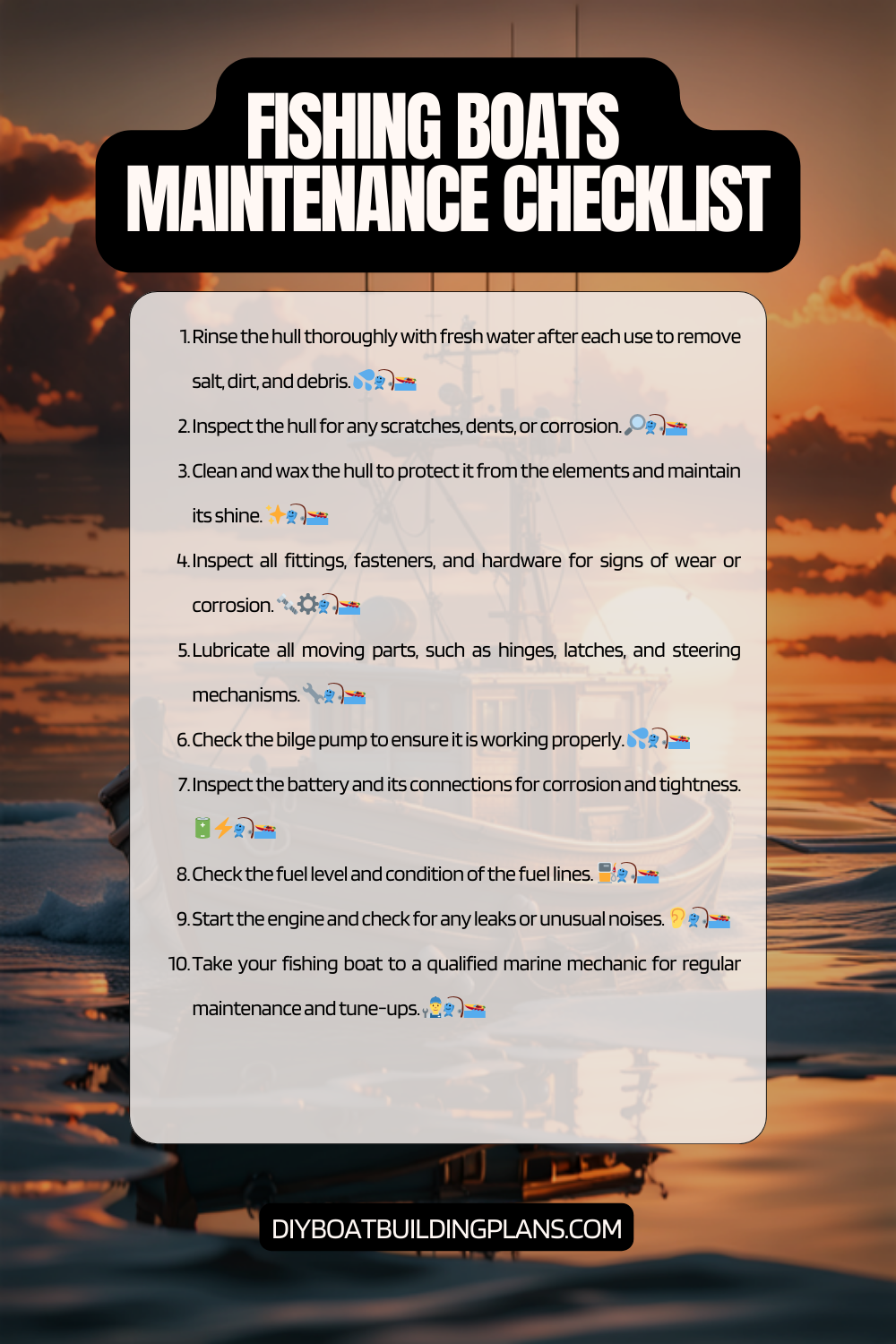Overview of Fishing Boat Maintenance Tips
Fishing boat maintenance is an essential aspect of owning and operating a fishing vessel. Whether you use your boat for recreational fishing or as a means of livelihood, regular maintenance is crucial to ensure its longevity and optimal performance. Neglecting maintenance can lead to costly repairs, decreased fuel efficiency, and even safety hazards.
In this article, we will explore the importance of regular maintenance for fishing boats, discuss the essential tools and equipment needed for maintenance tasks, provide cleaning and washing tips, explain how to check and replace boat batteries, offer tips for maintaining engines and fuel systems, inspecting and repairing hulls and decks, maintaining electrical systems and wiring, storing boats during off-seasons, maintaining trailers and towing equipment, and highlight safety precautions to keep in mind during maintenance activities.
Key Takeaways
- Regular maintenance is crucial for the longevity and safety of fishing boats.
- Essential tools and equipment for maintenance include a pressure washer, grease gun, and multimeter.
- Cleaning and washing tips include using a mild detergent and avoiding high-pressure water on electrical components.
- Checking and replacing fishing boat batteries should be done annually and using a marine-specific battery is recommended.
- Safety precautions for maintenance include wearing protective gear and disconnecting the battery before working on electrical systems.

Importance of Regular Maintenance for Fishing Boats
Regular maintenance is vital for fishing boats due to the harsh conditions they are exposed to on a regular basis. Saltwater, sun exposure, and constant use can take a toll on various components of the boat. By performing routine maintenance tasks, you can prevent minor issues from escalating into major problems that could potentially render your boat inoperable.
One of the primary benefits of regular maintenance is increased fuel efficiency. Over time, marine growth such as barnacles and algae can accumulate on the hull of the boat, causing drag and reducing fuel efficiency. By regularly cleaning the hull and applying antifouling paint, you can minimize this drag and improve fuel economy.
Additionally, regular maintenance allows you to identify any potential issues before they become serious problems. By inspecting your boat regularly, you can catch small leaks, cracks, or wear and tear in various components such as the hull, deck, or electrical systems. Addressing these issues promptly can save you from costly repairs down the line.
Essential Tools and Equipment for Fishing Boat Maintenance
To effectively maintain your fishing boat, it is essential to have the right tools and equipment at your disposal. Here are some of the must-have items for fishing boat maintenance:
1. Screwdrivers and wrenches: These basic tools are necessary for various tasks such as tightening loose screws or bolts.
2. Pliers: Pliers come in handy for tasks that require gripping, bending, or cutting wires, cables, or hoses.
3. Multimeter: A multimeter is an essential tool for troubleshooting electrical issues on your boat. It can measure voltage, current, and resistance.
4. Cleaning supplies: You will need a variety of cleaning supplies such as boat soap, brushes, sponges, and a pressure washer to keep your boat clean and free from dirt, grime, and salt residue.
5. Lubricants: Lubricants such as marine grease or silicone spray are necessary for lubricating moving parts and preventing corrosion.
6. Safety equipment: Always have safety equipment on board, including life jackets, fire extinguishers, first aid kits, and emergency flares.
Having these tools readily available will make it easier for you to perform routine maintenance tasks and address any issues that may arise during your fishing trips.
Cleaning and Washing Tips for Fishing Boats
| Tip | Description |
| Use a pressure washer | A pressure washer can help remove stubborn dirt and grime from the boat’s surface. |
| Use a mild detergent | Using a mild detergent can help clean the boat without damaging the paint or finish. |
| Clean the bilge regularly | The bilge can accumulate oil and other debris, so it’s important to clean it regularly to prevent buildup. |
| Wash the boat after each use | Washing the boat after each use can help prevent dirt and grime from building up over time. |
| Use a boat cover | Using a boat cover can help protect the boat from the elements and prevent dirt and debris from accumulating. |
Regular cleaning and washing are essential for maintaining the appearance and functionality of your fishing boat. Here are some tips to keep in mind:
1. Rinse with freshwater: After each use, rinse your boat thoroughly with freshwater to remove salt residue that can cause corrosion.
2. Use boat soap: Use a mild boat soap specifically designed for marine use to clean the exterior of your boat. Avoid using harsh chemicals that can damage the gel coat or paint.
3. Scrub the deck: Scrub the deck with a brush to remove dirt, fish scales, and other debris. Pay special attention to areas prone to buildup such as corners and crevices.
4. Clean upholstery and carpets: Use a marine-grade cleaner to clean upholstery and carpets. Follow the manufacturer’s instructions and avoid using excessive water that can lead to mold or mildew.
5. Wax the hull: Apply a coat of wax to the hull to protect it from UV rays and minimize oxidation. Waxing also makes it easier to remove dirt and stains.
6. Don’t forget the trailer: Clean and inspect your boat trailer regularly. Remove any debris, lubricate moving parts, and check the tires for wear and proper inflation.
By following these cleaning and washing tips, you can keep your fishing boat looking great and extend its lifespan.
How to Check and Replace Fishing Boat Batteries
The batteries in your fishing boat are crucial for powering various electrical systems such as lights, navigation equipment, and fish finders. Regularly checking and maintaining your boat batteries is essential to ensure they are in good working condition. Here’s how you can do it:
1. Visual inspection: Start by visually inspecting the battery terminals for any signs of corrosion or loose connections. Corrosion can be cleaned using a mixture of baking soda and water.
2. Check voltage: Use a multimeter to check the voltage of each battery. A fully charged battery should read around 12.6 volts. If the voltage is significantly lower, it may indicate a weak or discharged battery.
3. Load test: Perform a load test on each battery to determine its capacity to deliver power under load. This test will help identify weak or failing batteries that need replacement.
4. Replace if necessary: If any of the batteries fail the load test or show signs of deterioration, it is recommended to replace them with new ones. Always choose marine-grade batteries suitable for your boat’s electrical requirements.
When replacing batteries, make sure to follow proper safety precautions such as disconnecting the negative terminal first and avoiding sparks or open flames near the battery compartment.
Tips for Maintaining Fishing Boat Engines and Fuel Systems
The engine and fuel system are the heart of your fishing boat, and proper maintenance is crucial to ensure their reliability and performance. Here are some tips for maintaining your boat’s engine and fuel system:
1. Regularly change oil and filters: Follow the manufacturer’s recommendations for oil and filter changes. Regular oil changes help remove contaminants and ensure proper lubrication of engine components.
2. Check fuel filters: Inspect and replace fuel filters regularly to prevent clogs that can restrict fuel flow and affect engine performance.
3. Use quality fuel: Always use high-quality fuel that meets the manufacturer’s specifications. Avoid using old or contaminated fuel that can cause engine problems.
4. Inspect hoses and connections: Regularly inspect fuel hoses and connections for signs of wear, leaks, or loose fittings. Replace any damaged or deteriorated components.
5. Flush the cooling system: If your boat has a raw water cooling system, flush it regularly to remove salt, sand, or debris that can clog the system and cause overheating.
6. Winterize the engine: If you live in an area with freezing temperatures, it is essential to winterize your boat’s engine to prevent damage from freezing water. Follow the manufacturer’s guidelines or consult a professional for proper winterization procedures.
By following these tips, you can ensure that your fishing boat’s engine and fuel system are in optimal condition, providing you with reliable performance on your fishing adventures.
Inspecting and Repairing Fishing Boat Hulls and Decks
The hull and deck of your fishing boat are constantly exposed to harsh conditions such as saltwater, UV rays, impacts, and abrasion. Regular inspection and repair of these areas are essential to maintain the structural integrity of your boat. Here’s what you need to do:
1. Visual inspection: Inspect the hull and deck for any signs of cracks, dents, or delamination. Pay attention to areas around fittings, through-hulls, and stress points.
2. Repair gel coat damage: If you notice any gel coat damage such as scratches or chips, repair them promptly to prevent water intrusion and further deterioration. Use a gel coat repair kit and follow the manufacturer’s instructions.
3. Check for soft spots: Soft spots on the deck can indicate water intrusion and rotting of the core material. If you find any soft spots, it is crucial to address them promptly to prevent further damage. Consult a professional if necessary.
4. Maintain anti-skid surfaces: If your boat has anti-skid surfaces on the deck, regularly clean and maintain them to ensure their effectiveness. Replace worn-out or damaged anti-skid materials as needed.
5. Inspect through-hulls and fittings: Inspect through-hulls and fittings for leaks or signs of corrosion. Replace any damaged or deteriorated components.
6. Clean and wax the hull: Regularly clean the hull to remove marine growth and dirt that can cause damage over time. Apply a coat of wax to protect the hull from UV rays and minimize oxidation.
By regularly inspecting and repairing your fishing boat’s hull and deck, you can ensure its structural integrity and prolong its lifespan.
Maintaining Fishing Boat Electrical Systems and Wiring
The electrical systems and wiring in your fishing boat are responsible for powering various components such as lights, pumps, navigation equipment, and entertainment systems. Proper maintenance is crucial to ensure their reliability and safety. Here are some tips for maintaining your boat’s electrical systems:
1. Inspect wiring: Regularly inspect the wiring for any signs of wear, fraying, or loose connections. Repair or replace damaged wiring as needed.
2. Check connections: Inspect electrical connections for corrosion or loose fittings. Clean connections with a wire brush and apply dielectric grease to prevent corrosion.
3. Test batteries: Regularly test the batteries to ensure they are holding a charge and providing sufficient power. Clean battery terminals and apply a corrosion inhibitor to prevent corrosion.
4. Check circuit breakers and fuses: Inspect circuit breakers and fuses for any signs of damage or tripping. Replace faulty breakers or fuses with the correct rating.
5. Test electrical components: Test all electrical components such as lights, pumps, and navigation equipment to ensure they are functioning properly. Replace any faulty components.
6. Keep electrical panels clean: Regularly clean electrical panels to remove dust, dirt, or debris that can cause electrical issues. Avoid using excessive water that can damage sensitive components.
By following these tips, you can maintain the reliability and safety of your fishing boat’s electrical systems, ensuring a smooth and enjoyable boating experience.
Tips for Storing Fishing Boats During Off-Seasons
When the fishing season comes to an end or if you won’t be using your boat for an extended period, proper storage is essential to protect your investment. Here are some tips for storing your fishing boat during off-seasons:
1. Clean and dry: Thoroughly clean your boat, both inside and out, before storing it. Remove any dirt, grime, or marine growth that can cause damage over time. Make sure the boat is completely dry to prevent mold or mildew growth.
2. Remove valuables: Remove any valuable items such as electronics, fishing gear, or personal belongings from the boat to prevent theft or damage.
3. Cover the boat: Use a high-quality boat cover to protect your boat from dust, UV rays, and the elements. Ensure the cover is properly secured to prevent it from coming loose during strong winds.
4. Choose a suitable storage location: If possible, store your boat in a covered storage facility or garage to protect it from extreme weather conditions. If outdoor storage is the only option, choose a location that provides adequate protection from the elements.
5. Maintain the battery: If you won’t be using your boat for an extended period, it is recommended to remove the batteries and store them in a cool, dry place. Alternatively, you can use a battery maintainer or trickle charger to keep the batteries charged.
6. Perform maintenance tasks: Before storing your boat, perform any necessary maintenance tasks such as changing oil and filters, winterizing the engine, and inspecting and repairing any damaged components.
By following these tips, you can ensure that your fishing boat remains in good condition during off-seasons and is ready for your next fishing adventure.
How to Maintain Fishing Boat Trailers and Towing Equipment
Proper maintenance of your fishing boat trailer and towing equipment is essential for safe and hassle-free transportation of your boat. Here are some tips for maintaining your boat trailer:
1. Inspect tires: Regularly inspect the tires for wear, cracks, or bulges. Check the tire pressure and ensure it matches the manufacturer’s recommendations. Replace any damaged or worn-out tires.
2. Grease wheel bearings: Grease the wheel bearings regularly to prevent friction and ensure smooth operation. Follow the manufacturer’s guidelines for proper greasing intervals.
3. Check lights and wiring: Inspect the trailer lights and wiring for any signs of damage or corrosion. Replace faulty bulbs or damaged wiring as needed.
4. Lubricate moving parts: Lubricate moving parts such as hinges, winches, and rollers to prevent rust and ensure smooth operation.
5. Inspect trailer frame: Regularly inspect the trailer frame for any signs of rust or damage. Repair or replace any corroded or weakened sections.
6. Secure boat properly: Ensure that your boat is securely fastened to the trailer using appropriate straps or tie-downs. Check the straps regularly for signs of wear or damage.
By following these maintenance tips, you can ensure the safety and reliability of your fishing boat trailer, allowing you to transport your boat with peace of mind.
Download over 500 Boat Plans. Click on the link below.
-->Click Here<--
Safety Precautions for Fishing Boat Maintenance
While performing maintenance tasks on your fishing boat, it is crucial to prioritize safety to prevent accidents or injuries. Here are some safety precautions to keep in mind:
1. Use personal protective equipment (PPE): Always wear appropriate PPE such as safety glasses, gloves, and non-slip footwear when working on your boat. PPE can protect you from potential hazards such as chemicals, sharp objects, or electrical shocks.
2. Disconnect power sources: Before working on any electrical components, disconnect the power source and ensure that circuits are de-energized. This will minimize the risk of electrical shock.
3. Ventilate enclosed spaces: If you need to work in enclosed spaces such as engine compartments or bilges, ensure proper ventilation to prevent the buildup of toxic fumes or gases.
4. Use proper lifting techniques: When lifting heavy objects or equipment, use proper lifting techniques to avoid strain or injury. If necessary, use mechanical aids such as hoists or pulleys.
5. Follow manufacturer’s instructions: Always follow the manufacturer’s instructions and guidelines when performing maintenance tasks or using tools and equipment. Improper use can lead to accidents or damage to your boat.
6. Seek professional help if needed: If you are unsure about any maintenance task or encounter a complex issue, it is best to seek professional help from a qualified marine technician. They have the expertise and knowledge to properly diagnose and fix any problems with your boat. Trying to tackle a difficult issue on your own could potentially make the problem worse or even cause harm to yourself or the boat. By consulting a professional, you can ensure that your boat is properly maintained and running smoothly, giving you peace of mind while out on the water.
Fishing Boat Maintenance Checklist

Conclusion – Fishing Boat Maintenance Tips
In conclusion, fishing boat maintenance is an essential practice for boat owners, whether for recreational or commercial use. The article has provided valuable insights into what fishing boat maintenance entails, from inspecting various boat components to cleaning and protecting your vessel. Understanding the significance of regular maintenance is crucial, as it not only extends the lifespan of your fishing boat but also enhances its performance and safety.
By inspecting and addressing any damage promptly, you can prevent more severe issues from arising in the future. Additionally, keeping your boat clean and protected from the elements helps maintain its appearance and value. Regular maintenance can save you money on costly repairs and improve fuel efficiency, ensuring a smoother and safer fishing experience.
The benefits of maintaining your fishing boat are numerous. You can enjoy your fishing trips without worrying about breakdowns, catch more fish with an efficient boat, and protect your investment by preserving its beauty and value. Moreover, proper maintenance safeguards your health and the environment from harmful substances and organisms that may accumulate on your boat.
To fully reap these benefits, it is essential to perform fishing boat maintenance tasks regularly and correctly. Consult your boat’s manual or seek professional advice to ensure you use the right tools and materials for your specific boat type and condition. By following the maintenance tips provided in this article, you can enjoy many years of trouble-free and enjoyable fishing adventures.
FAQs – Fishing Boat Maintenance Tips
What is fishing boat maintenance?
Fishing boat maintenance refers to the regular upkeep and repair of a fishing boat to ensure its proper functioning and longevity.
Why is fishing boat maintenance important?
Fishing boat maintenance is important to ensure the safety of the crew and passengers, prevent breakdowns and costly repairs, and prolong the life of the boat.
What are some common fishing boat maintenance tasks?
Common fishing boat maintenance tasks include cleaning and waxing the hull, checking and replacing fluids, inspecting and repairing electrical systems, and replacing worn or damaged parts.
How often should fishing boats be maintained?
Fishing boats should be maintained regularly, with some tasks needing to be done daily or weekly, while others can be done monthly or annually.
What are some tips for maintaining a fishing boat?
Some tips for maintaining a fishing boat include keeping it clean and dry, checking and replacing fluids regularly, inspecting and repairing electrical systems, and storing it properly when not in use.
Can fishing boat maintenance be done by the owner?
Yes, many fishing boat maintenance tasks can be done by the owner, but some may require the assistance of a professional mechanic or boat technician.



